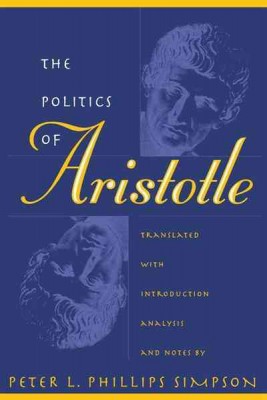| Politics of Aristotle Contributor(s): Simpson, Peter L. Phillips (Editor) |
|
 |
ISBN: 0807846376 ISBN-13: 9780807846377 Publisher: University of North Carolina Press OUR PRICE: $40.38 Product Type: Paperback - Other Formats Published: March 1997 Annotation: A touchstone in Western debates about society and government, the "Politics" is Aristotle's classic work on the nature of political community. Here, he argues that people band together into political communities to secure a good and self-sufficient life. He discusses the merits and defects of various regimes or ways of organizing political community--democracy in particular--and in the process examines such subjects as slavery, economics, the family, citizenship, justice, and revolution. Peter Simpson offers a new translation of Aristotle's text from the ancient Greek. He renders the "Politics" into an English version that is accurate, readable, and in certain difficult passages, original. His innovative analytical division of the whole text, with headings and accompanying summaries, makes clear the progression and unity of the argument--a helpful feature for students or readers unfamiliar with Aristotle's studied brevity and often elliptical style. Books 7 and 8 are repositioned--a move supported by Aristotle's own words and much scholarly opinion--to restore the work's logical organization and coherence. Finally, Simpson places the "Politics" in its proper philosophical context by beginning the text with the last chapter of Aristotle's "Nicomachean Ethics," which he sees as an introduction to what follows. |
| Additional Information |
| BISAC Categories: - Philosophy | Political - Philosophy | History & Surveys - Ancient & Classical |
| Dewey: 320.011 |
| LCCN: 96-30395 |
| Physical Information: 0.86" H x 6.08" W x 9.15" (1.06 lbs) 320 pages |
| Descriptions, Reviews, Etc. |
| Publisher Description: A touchstone in Western debates about society and government, the Politics is Aristotle's classic work on the nature of political community. Here, he argues that people band together into political communities to secure a good and self-sufficient life. He discusses the merits and defects of various regimes or ways of organizing political community--democracy in particular--and in the process examines such subjects as slavery, economics, the family, citizenship, justice, and revolution.Peter Simpson offers a new translation of Aristotle's text from the ancient Greek. He renders the Politics into an English version that is accurate, readable, and in certain difficult passages, original. His innovative analytical division of the whole text, with headings and accompanying summaries, makes clear the progression and unity of the argument--a helpful feature for students or readers unfamiliar with Aristotle's studied brevity and often elliptical style. Books 7 and 8 are repositioned--a move supported by Aristotle's own words and much scholarly opinion--to restore the work's logical organization and coherence. Finally, Simpson places the Politics in its proper philosophical context by beginning the text with the last chapter of Aristotle's Nicomachean Ethics, which he sees as an introduction to what follows. |
Contributor Bio(s): Simpson, Peter L. Phillips: - Peter L. Phillips Simpson is professor of philosophy and classics at the Graduate Center and the College of Staten Island, City University of New York. |